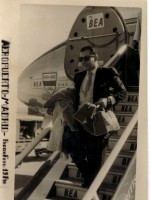Raymond Burr is a Actor Canadien born on 21 may 1917 at New Westminster (Canada)

Raymond William Stacey Burr (May 21, 1917 – September 12, 1993) was a Canadian-American actor, primarily known for his title roles in the television dramas Perry Mason and Ironside. He was prominently involved in multiple charitable endeavors, such as working on behalf of the United Service Organizations.
Burr's early acting career included roles on Broadway, radio, television and in film, usually as the villain.
His portrayal of the suspected murderer in the Alfred Hitchcock thriller, Rear Window (1954), is regarded as his best-known film role. He won two Emmy Awards, in 1959 and 1961, for the role of Perry Mason, which he played for nine seasons between 1957 and 1966. His second hit TV series, Ironside, earned him six Emmy nominations and two Golden Globe nominations.
After Burr's death from cancer in 1993, his personal life came into question, as details of his known biography appeared to be unverifiable.
In 1996, Burr was listed as one of the 50 Greatest TV Stars of All Time by TV Guide. A 2014 study found that Burr was rated as the favorite actor by Netflix users, with the greatest number of dedicated microgenres.
Burr married actress Isabella ("Bella") Ward on January 10, 1948. They lived together for less than a year, and divorced after four years. Neither remarried. In the mid-1950s, Burr met Robert Benevides (born February 9, 1930, in Visalia, California) a young actor and Korean War veteran, on the set of Perry Mason. According to Benevides, they became a couple around 1960. Benevides gave up acting in 1963 and later became a production consultant for 21 of the Perry Mason TV movies. Together they owned and operated an orchid business and then a vineyard, in the Dry Creek Valley. They were partners until Burr's death in 1993. Burr left Benevides his entire estate, including "all my jewelry, clothing, books, works of art ... and other items of a personal nature." Benevides subsequently renamed the Dry Creek property Raymond Burr Vineyards (reportedly against Burr's wishes) and continues to own and manage it as a commercial enterprise.
Controversy
At various times in his career, Burr and his managers offered spurious or unverifiable biographical details to the press and public. These included a 1940 marriage to a Scottish actress named Annette Sutherland—killed, Burr said, in the same plane crash that claimed the life of Leslie Howard. (Multiple sources, including Burr's biographer, have reported that no one by that name appears on any of the published passenger manifests from the flight.) Another undocumented marriage in 1953 to Laura Andrina Morgan—who died of cancer, Burr said, in 1955—produced a son, Michael Evan, who purportedly died at age ten of leukemia. (No evidence exists of the marriage, nor of a son's birth, other than Burr's own claims.) As late as 1991, Burr stood by the account of his son's life and death; he told Parade magazine that when he realized Michael was dying, he took him on a one-year tour of the United States. "Before my boy left, before his time was gone," he said, "I wanted him to see the beauty of his country and its people." According to his publicist, Burr worked in Hollywood throughout the year that he was supposedly touring with his son. Burr's stories about his World War II service in the Marine Corps, including battle injuries in Okinawa, were similarly unverified.
In the late 1950s, Burr was rumored to be romantically involved with Natalie Wood. Wood's agent sent her on public dates so she could be noticed by directors and producers and so the men she dated could present themselves in public as heterosexuals. The dates also helped to disguise Wood's intimate relationship with Robert Wagner, whom she later married. Burr felt enough attraction to Wood to resent Warner Bros.' decision to promote her attachment to Tab Hunter, instead. Robert Benevides later said: "He was a little bitter about it. He was really in love with her, I guess."
Later accounts of Burr's life explain that he hid his homosexuality to protect his career. In 2000, AP reporter Bob Thomas recalled the situation:
It was an open secret...that he was gay. He had a companion who was with him all the time. That was a time in Hollywood history when homosexuality was not countenanced. Ray was not a romantic star by any means, but he was a very popular figure...if it was revealed at that time in Hollywood history [that he was gay] it would have been very difficult for him to continue.
Art Marks, a producer of Perry Mason, recalled Burr's talk of wives and children: "I know he was just putting on a show....That was my gut feeling. I think the wives and the loving women, the Natalie Wood thing, were a bit of a cover." In 2006, Dean Hargrove, who worked on Perry Mason Returns, said: "I had always assumed that Raymond was gay, because he had a relationship with Robert Benevides for a very long time. Whether or not he had relationships with women, I had no idea. I did know that I had trouble keeping track of whether he was married or not in these stories. Raymond had the ability to mythologize himself, to some extent, and some of his stories about his past...tended to grow as time went by."
A 2007 memoir by actor Paul Picerni described several experiences with Burr on the set of Mara Maru, when he felt Burr expressed sexual interest in him. He wrote, "I saw him staring at me. With his big blue eyes. And with this strange expression on his face. For the first time in my life, I felt like a dame. Then it hit me: He'd been giving me all this bullshit about his wife and his two kids in London, when in fact he was gay, and he was makin' a move on me!" He remembered Burr "was a great guy and very subtle in his homosexuality."
Hobbies
Burr had many hobbies over the course of his life: cultivating orchids and collecting wine, art, stamps, and seashells. He was very fond of cooking. As a dedicated seashell collector, his financial support and gift of cowries and cones from Fiji helped to create the Bailey-Matthews National Shell Museum in Sanibel, Florida. He was also interested in flying, sailing, and fishing. According to A&E Biography, Burr was an avid reader with a retentive memory. He was also among the earliest importers and breeders of Portuguese Water Dogs in the United States.
He developed his interest in cultivating and hybridizing orchids into a business with Benevides. Over 20 years, their company, Sea God Nurseries, had nurseries in Fiji, Hawaii, the Azores, and California, and was responsible for adding more than 1,500 new orchids to the worldwide catalog. Burr named one of them the "Barbara Hale Orchid" after his Perry Mason costar. Burr and Benevides cultivated Cabernet Sauvignon, Chardonnay, and Port grapes, as well as orchids, at Burr's farmland holdings in Sonoma County, California.
In 1965, Burr purchased the Naitauba, a 4,000-acre (16 km) island in Fiji, rich in seashells. There, he and Benevides oversaw the raising of copra (coconut meat) and cattle, as well as orchids. Burr planned to retire there permanently. However, medical problems made that impossible and he sold the property in 1983.
Philanthropy
Burr was a well-known philanthropist. He gave enormous sums of money, including his salaries from the Perry Mason movies, to charity. He was also known for sharing his wealth with friends. He sponsored 26 foster children through the Foster Parents' Plan or Save The Children, many with the greatest medical needs. He also gave money and some of his Perry Mason scripts to the McGeorge School of Law in Sacramento, California.
Burr raised money for the Bailey-Matthews Shell Museum in Sanibel, Florida, and also donated a considerable collection of Fijian cowries and cones from his island in the Fijis. In 1993, Sonoma State University awarded Burr an honorary doctorate. He supported medical and education institutions in Denver, and in 1993, the University of Colorado awarded him an honorary doctorate for his acting work. Burr also founded and financed the American Fijian Foundation that funded academic research, including efforts to develop a dictionary of the language.
Burr made repeated trips on behalf of the United Service Organizations (USO). He toured both Korea and Vietnam during wartime and once spent six months touring Korea, Japan, and the Philippines. He sometimes organized his own troupe and toured bases both in the U.S. and overseas, often small installations that the USO did not serve, like one tour of Greenland, Baffinland, Newfoundland and Labrador. Returning from Vietnam in 1965, he made a speaking tour of the U.S. to advocate an intensified war effort. As the war became more controversial, he modified his tone, called for more attention to the sacrifice of the troops, and said, "My only position on the war is that I wish it were over." In October 1967, NBC aired Raymond Burr Visits Vietnam, a documentary of one of his visits that received mixed reviews, ranging from "The impressions he came up with are neither weighty nor particularly revealing" (Chicago Tribune) to "His questions...were intelligent and elicited some interesting replies." (Los Angeles Times).
Burr had a reputation in Hollywood as a thoughtful, generous man years before much of his more-visible philanthropic work. In 1960, Ray Collins, who portrayed Lt. Arthur Tragg on the original Perry Mason series, and who was by that time often ill and unable to remember all the lines he was supposed to speak, stated, "There is nothing but kindness from our star, Ray Burr. Part of his life is dedicated to us, and that's no bull. If there's anything the matter with any of us, he comes around before anyone else and does what he can to help. He's a great star—in the old tradition.
Source : Wikidata
Raymond Burr

Birth name Raymond William Stacey Burr
Nationality Canada
Birth 21 may 1917 at New Westminster (Canada)
Death 12 september 1993 (at 76 years) at Sonoma (USA)
Nationality Canada
Birth 21 may 1917 at New Westminster (Canada)
Death 12 september 1993 (at 76 years) at Sonoma (USA)
Burr's early acting career included roles on Broadway, radio, television and in film, usually as the villain.
His portrayal of the suspected murderer in the Alfred Hitchcock thriller, Rear Window (1954), is regarded as his best-known film role. He won two Emmy Awards, in 1959 and 1961, for the role of Perry Mason, which he played for nine seasons between 1957 and 1966. His second hit TV series, Ironside, earned him six Emmy nominations and two Golden Globe nominations.
After Burr's death from cancer in 1993, his personal life came into question, as details of his known biography appeared to be unverifiable.
In 1996, Burr was listed as one of the 50 Greatest TV Stars of All Time by TV Guide. A 2014 study found that Burr was rated as the favorite actor by Netflix users, with the greatest number of dedicated microgenres.
Biography
Family lifeBurr married actress Isabella ("Bella") Ward on January 10, 1948. They lived together for less than a year, and divorced after four years. Neither remarried. In the mid-1950s, Burr met Robert Benevides (born February 9, 1930, in Visalia, California) a young actor and Korean War veteran, on the set of Perry Mason. According to Benevides, they became a couple around 1960. Benevides gave up acting in 1963 and later became a production consultant for 21 of the Perry Mason TV movies. Together they owned and operated an orchid business and then a vineyard, in the Dry Creek Valley. They were partners until Burr's death in 1993. Burr left Benevides his entire estate, including "all my jewelry, clothing, books, works of art ... and other items of a personal nature." Benevides subsequently renamed the Dry Creek property Raymond Burr Vineyards (reportedly against Burr's wishes) and continues to own and manage it as a commercial enterprise.
Controversy
At various times in his career, Burr and his managers offered spurious or unverifiable biographical details to the press and public. These included a 1940 marriage to a Scottish actress named Annette Sutherland—killed, Burr said, in the same plane crash that claimed the life of Leslie Howard. (Multiple sources, including Burr's biographer, have reported that no one by that name appears on any of the published passenger manifests from the flight.) Another undocumented marriage in 1953 to Laura Andrina Morgan—who died of cancer, Burr said, in 1955—produced a son, Michael Evan, who purportedly died at age ten of leukemia. (No evidence exists of the marriage, nor of a son's birth, other than Burr's own claims.) As late as 1991, Burr stood by the account of his son's life and death; he told Parade magazine that when he realized Michael was dying, he took him on a one-year tour of the United States. "Before my boy left, before his time was gone," he said, "I wanted him to see the beauty of his country and its people." According to his publicist, Burr worked in Hollywood throughout the year that he was supposedly touring with his son. Burr's stories about his World War II service in the Marine Corps, including battle injuries in Okinawa, were similarly unverified.
In the late 1950s, Burr was rumored to be romantically involved with Natalie Wood. Wood's agent sent her on public dates so she could be noticed by directors and producers and so the men she dated could present themselves in public as heterosexuals. The dates also helped to disguise Wood's intimate relationship with Robert Wagner, whom she later married. Burr felt enough attraction to Wood to resent Warner Bros.' decision to promote her attachment to Tab Hunter, instead. Robert Benevides later said: "He was a little bitter about it. He was really in love with her, I guess."
Later accounts of Burr's life explain that he hid his homosexuality to protect his career. In 2000, AP reporter Bob Thomas recalled the situation:
It was an open secret...that he was gay. He had a companion who was with him all the time. That was a time in Hollywood history when homosexuality was not countenanced. Ray was not a romantic star by any means, but he was a very popular figure...if it was revealed at that time in Hollywood history [that he was gay] it would have been very difficult for him to continue.
Art Marks, a producer of Perry Mason, recalled Burr's talk of wives and children: "I know he was just putting on a show....That was my gut feeling. I think the wives and the loving women, the Natalie Wood thing, were a bit of a cover." In 2006, Dean Hargrove, who worked on Perry Mason Returns, said: "I had always assumed that Raymond was gay, because he had a relationship with Robert Benevides for a very long time. Whether or not he had relationships with women, I had no idea. I did know that I had trouble keeping track of whether he was married or not in these stories. Raymond had the ability to mythologize himself, to some extent, and some of his stories about his past...tended to grow as time went by."
A 2007 memoir by actor Paul Picerni described several experiences with Burr on the set of Mara Maru, when he felt Burr expressed sexual interest in him. He wrote, "I saw him staring at me. With his big blue eyes. And with this strange expression on his face. For the first time in my life, I felt like a dame. Then it hit me: He'd been giving me all this bullshit about his wife and his two kids in London, when in fact he was gay, and he was makin' a move on me!" He remembered Burr "was a great guy and very subtle in his homosexuality."
Hobbies
Burr had many hobbies over the course of his life: cultivating orchids and collecting wine, art, stamps, and seashells. He was very fond of cooking. As a dedicated seashell collector, his financial support and gift of cowries and cones from Fiji helped to create the Bailey-Matthews National Shell Museum in Sanibel, Florida. He was also interested in flying, sailing, and fishing. According to A&E Biography, Burr was an avid reader with a retentive memory. He was also among the earliest importers and breeders of Portuguese Water Dogs in the United States.
He developed his interest in cultivating and hybridizing orchids into a business with Benevides. Over 20 years, their company, Sea God Nurseries, had nurseries in Fiji, Hawaii, the Azores, and California, and was responsible for adding more than 1,500 new orchids to the worldwide catalog. Burr named one of them the "Barbara Hale Orchid" after his Perry Mason costar. Burr and Benevides cultivated Cabernet Sauvignon, Chardonnay, and Port grapes, as well as orchids, at Burr's farmland holdings in Sonoma County, California.
In 1965, Burr purchased the Naitauba, a 4,000-acre (16 km) island in Fiji, rich in seashells. There, he and Benevides oversaw the raising of copra (coconut meat) and cattle, as well as orchids. Burr planned to retire there permanently. However, medical problems made that impossible and he sold the property in 1983.
Philanthropy
Burr was a well-known philanthropist. He gave enormous sums of money, including his salaries from the Perry Mason movies, to charity. He was also known for sharing his wealth with friends. He sponsored 26 foster children through the Foster Parents' Plan or Save The Children, many with the greatest medical needs. He also gave money and some of his Perry Mason scripts to the McGeorge School of Law in Sacramento, California.
Burr raised money for the Bailey-Matthews Shell Museum in Sanibel, Florida, and also donated a considerable collection of Fijian cowries and cones from his island in the Fijis. In 1993, Sonoma State University awarded Burr an honorary doctorate. He supported medical and education institutions in Denver, and in 1993, the University of Colorado awarded him an honorary doctorate for his acting work. Burr also founded and financed the American Fijian Foundation that funded academic research, including efforts to develop a dictionary of the language.
Burr made repeated trips on behalf of the United Service Organizations (USO). He toured both Korea and Vietnam during wartime and once spent six months touring Korea, Japan, and the Philippines. He sometimes organized his own troupe and toured bases both in the U.S. and overseas, often small installations that the USO did not serve, like one tour of Greenland, Baffinland, Newfoundland and Labrador. Returning from Vietnam in 1965, he made a speaking tour of the U.S. to advocate an intensified war effort. As the war became more controversial, he modified his tone, called for more attention to the sacrifice of the troops, and said, "My only position on the war is that I wish it were over." In October 1967, NBC aired Raymond Burr Visits Vietnam, a documentary of one of his visits that received mixed reviews, ranging from "The impressions he came up with are neither weighty nor particularly revealing" (Chicago Tribune) to "His questions...were intelligent and elicited some interesting replies." (Los Angeles Times).
Burr had a reputation in Hollywood as a thoughtful, generous man years before much of his more-visible philanthropic work. In 1960, Ray Collins, who portrayed Lt. Arthur Tragg on the original Perry Mason series, and who was by that time often ill and unable to remember all the lines he was supposed to speak, stated, "There is nothing but kindness from our star, Ray Burr. Part of his life is dedicated to us, and that's no bull. If there's anything the matter with any of us, he comes around before anyone else and does what he can to help. He's a great star—in the old tradition.
Best films
Usually with
Filmography of Raymond Burr (73 films)
Actor
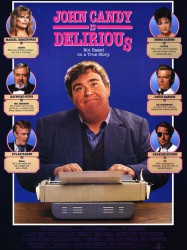
Delirious (1991)
, 1h32Directed by Tom Mankiewicz
Origin USA
Genres Science fiction, Fantastic, Comedy, Fantasy, Romance
Themes Films about films, Films about television
Actors John Candy, Mariel Hemingway, Emma Samms, David Rasche, Raymond Burr, Dylan Walsh
Roles Carter Hedison
Rating57%





Jack Gable (Candy) is the New York City-based lead writer and producer of the soap opera "Beyond Our Dreams". Consumed by his work, he harbors an unspoken attraction to Laura Claybourne (Samms), the selfish actress playing the lead character of Rachel Hedison.

The Return of Godzilla (1985)
, 1h43Directed by Kōji Yakusho, Kōji Hashimoto
Origin Japon
Genres Drama, Science fiction, Thriller, Action, Horror
Themes Films about animals, Dinosaur films, La fin du monde, Kaiju films, Films about magic and magicians, Seafaring films, La préhistoire, Transport films, Animaux préhistoriques, Giant monster films, Godzilla films, Films about extraterrestrial life, Disaster films
Actors Yasuko Sawaguchi, Ken Tanaka, Raymond Burr, Keiju Kobayashi, David Ury, Eitarō Ozawa
Roles Steven Martin
Rating67%





After a volcanic eruption on Daikoku Island, the Yahata-Maru Japanese fishing vessel is caught in strong currents off its shores. As the boat drifts into shore, the island begins to erupt, and a giant monster lifts itself out of the volcano. A few days later, reporter Goro Maki is sailing in the area and finds the vessel intact but deserted. As he explores the vessel, he finds all the crew dead except for one young man called Hiroshi Okamura, who has been badly wounded. Suddenly a giant Shockirus sea louse attacks him but he is saved by Maki who kills it with a cleaver.

Godzilla 1985 (1985)
, 1h27Directed by Kōji Hashimoto
Origin USA
Genres Drama, Science fiction, Thriller, Action, Horror
Themes Films about animals, Dinosaur films, Kaiju films, Seafaring films, La préhistoire, Transport films, Giant monster films, Godzilla films, Disaster films
Actors Raymond Burr, Ken Tanaka, Yasuko Sawaguchi, Keiju Kobayashi, Eitarō Ozawa, Hiroshi Koizumi
Roles Steven Martin
Rating61%





The Japanese fishing vessel Yahata Maru is trying to find its way to shore in a horrible storm while near an uninhabited island, when a giant monster appears out of the island and attacks the boat. A day later, reporter Goro Maki finds the vessel intact, along with its sole survivor Hiroshi "Kenny" Okumura.
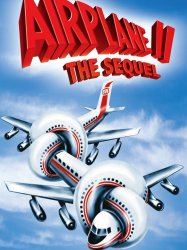
Airplane II: The Sequel (1982)
, 1h25Directed by Ken Finkleman
Origin USA
Genres Science fiction, Comedy, Adventure, Comic science fiction
Themes Space adventure films, Transport films, Sur la Lune, Aviation films, Comedy science fiction films, Films set in the future, Dans un avion, Space opera
Actors Robert Hays, Julie Hagerty, Lloyd Bridges, Chad Everett, Peter Graves, Rip Torn
Roles Judge D.C. Simonton
Rating61%





In the near future, the Moon has been colonized and supports a station on its surface. A lunar shuttle known as Mayflower One is being rushed to launch from Houston. The head of the ground crew, The Sarge (Chuck Connors), does not like what is occurring, but he defers to the airline's management.

Out of the Blue (1981)
, 1h34Directed by Dennis Hopper
Origin USA
Genres Drama
Themes Films about families, Films about sexuality
Actors Linda Manz, Dennis Hopper, Sharon Farrell, Don Gordon, Raymond Burr, Jim Byrnes
Roles Dr. Brean
Rating71%





Cebe, 15 ans, est une enfant perturbée, elle vit seule avec sa mère à tendances héroïnomanes pendant que son père, alcoolique, est en prison pour 5 ans après avoir percuté un bus scolaire avec son camion et tué plusieurs enfants. La libération de son père va créer chez Cebe quelques difficultés d'adaptation...

Peter and Paul (1981)
, 3h14Directed by Robert Day
Origin USA
Genres Drama, Historical
Themes Films about religion
Actors Anthony Hopkins, Robert Foxworth, Eddie Albert, Raymond Burr, Denis Lill, José Ferrer
Roles Herod Agrippa I
Rating75%





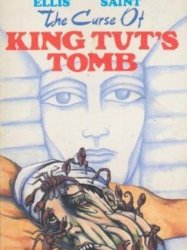
The Curse of King Tut's Tomb (1980)
, 1h38Directed by Philip Leacock
Genres Thriller, Horror, Crime
Actors Eva Marie Saint, Harry Andrews, Robin Ellis, Raymond Burr, Wendy Hiller, Angharad Rees
Roles Jonash Sabastian
Rating48%





The English archaeologist Howard Carter and his financier, Lord Carnarvon discover after years of search the grave of Tut-Ench-Amun. Rumors about a curse that invites to anyone who disturbs the peace grave circulate in public. For even the unscrupulous art collector Sabastian is after the legendary gold sarcophagus. The Curse of the Pharaoh seems to be effective, for there will be a series of mysterious deaths.

The Return (1980)
, 1h34Directed by Greydon Clark
Origin USA
Genres Science fiction, Thriller
Actors Jan-Michael Vincent, Cybill Shepherd, Martin Landau, Raymond Burr, Vincent Schiavelli, Neville Brand
Roles Dr. Kramer
Rating40%





While stopping at a gas station late one night in a small New Mexico town called Little Creek, a young girl gets out of the vehicle while her father goes inside. Exploring the empty main street of the town she meets a local boy, and both are soon mesmerized by a column of light from above. After a minute or two the light disappears and the young girl runs back to her father's car and they soon leave.
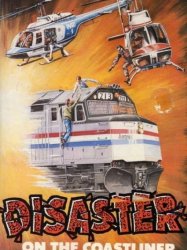
Disaster on the Coastliner (1979)
, 1h40Directed by Richard C. Sarafian
Origin USA
Genres Drama, Thriller, Action
Themes Transport films, Rail transport films
Actors Lloyd Bridges, Raymond Burr, Pat Hingle, E. G. Marshall, Yvette Mimieux, William Shatner
Roles Estes Hill
Rating58%






Love's Savage Fury (1979)
, 1h40Directed by Joseph Hardy
Origin USA
Genres Drama, War
Actors Jennifer O'Neill, Perry King, Jennifer O'Dell, Raymond Burr, Robert Reed, Debbi Morgan
Roles Lyle Taggart, Sr.
Rating56%





Pendant la Guerre de Sécession, une jeune femme sudiste essaie de tenir son foyer quand les Nordistes envahissent la région.

Tomorrow Never Comes (1978)
, 1h49Directed by Peter Collinson
Origin Canada
Genres Drama, Thriller, Action, Crime
Actors Oliver Reed, Susan George, Paul Koslo, Raymond Burr, John Ireland, Donald Pleasence
Roles Burke
Rating50%





Coming back from an extended business trip, Frank (Stephen McHattie) discovers that his girlfriend Janie (Susan George) is now working at a new resort hotel where the owner has given her a permanent place to stay, as well as other gifts, in exchange for her affections. In the course of fighting over this development, tensions between Frank and Janie escalate out of control until he is holding her hostage in a standoff with the police. As the negotiators (Oliver Reed, Paul Koslo) try to talk Frank into giving himself up, the desperate man feels himself being pushed further and further into a corner.

The Bastard (1978)
, 4hDirected by Lee H. Katzin
Origin USA
Genres Drama, War, Historical, Romance
Themes Political films
Actors Andrew Stevens, Tom Bosley, Kim Cattrall, Buddy Ebsen, Lorne Greene, Olivia Hussey
Roles Narrator (voice)
Rating68%





Phillipe Charboneau is the illegitimate son of an English duke. When he travels from France to England to claim his inheritance, he incurs the wrath of his father's family and is forced to flee to America, where he becomes involved in the events leading to the American Revolution.

Kingston (1975)
Directed by Robert Day
Genres Drama
Actors Bradford Dillman, Dina Merrill, Martin Kove, Lenka Peterson, Biff McGuire, Raymond Burr
Roles R.B. Kingston
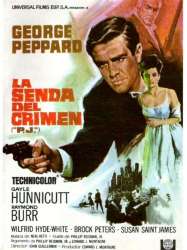
P.J. (1968)
, 1h49Directed by John Guillermin
Origin USA
Genres Drama, Thriller, Action, Crime
Actors George Peppard, Raymond Burr, Gayle Hunnicutt, Brock Peters, Wilfrid Hyde-White, Jason Evers
Roles William Orbison
Rating63%





New York City private eye P.J. (Peter Joseph) Detweiler needs the work, so he accepts an offer to be a bodyguard to protect Maureen Preble, the mistress of shady millionaire William Orbison.
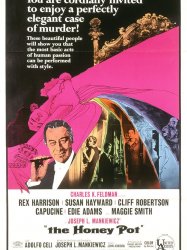
The Honey Pot (1967)
, 2h6Directed by Joseph L. Mankiewicz
Origin USA
Genres Drama, Thriller, Comedy, Comedy-drama, Crime
Themes Films based on plays
Actors Rex Harrison, Susan Hayward, Cliff Robertson, Capucine, Edie Adams, Maggie Smith
Roles Himself, as Perry Mason
Rating66%





Struggling actor William McFly (Cliff Robertson) is hired by wealthy Cecil Fox (Rex Harrison) to play his personal secretary for a practical joke. Pretending to be on his deathbed, Fox invites three former lovers to his Venetian palazzo for a final visit: penniless Princess Dominique (Capucine), fading movie star Merle McGill (Edie Adams), and Texas millionairess Mrs. Lone Star Crockett Sheridan (Susan Hayward). Accompanying Mrs. Sheridan is her spinster nurse, Sarah Watkins (Maggie Smith). By chance, each of the women brings Fox a timepiece as a present.
 Connection
Connection


